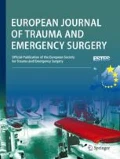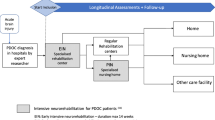Abstract
Introduction:
Epidemiology in Europe shows constantly increasing figures for the apallic syndrome (AS)/vegetative state (VS) as a consequence of advanced rescue, emergency services, intensive care treatment after acute brain damage and high-standard activating home nursing for completely dependent end-stage cases secondary to progressive neurological disease. Management of patients in irreversible permanent AS/VS has been the subject of sustained scientific and moral-legal debate over the past decade.
Methods:
A task force on guidelines for quality management of AS/VS was set up under the auspices of the Scientific Panel Neurotraumatology of the European Federation of Neurological Societies to address key issues relating to AS/VS prevalence and quality management. Collection and analysis of scientific data on class II (III) evidence from the literature and recommendations based on the best practice as resulting from the task force members' expertise are in accordance with EFNS Guidance regulations.
Findings:
The overall incidence of new AS/VS full stage cases all etiology is 0.5–2/100.000 population per year. About one third are traumatic and two thirds non traumatic cases. Increasing figures for hypoxic brain damage and progressive neurological disease have been noticed. The main conceptual criticism is based on the assessment and diagnosis of all different AS/VS stages based solely on behavioural findings without knowing the exact or uniform pathogenesis or neuropathological findings and the uncertainty of clinical assessment due to varying inclusion criteria. No special diagnostics, no specific medical management can be recommended for class II or III AS treatment and rehabilitation. This is why sine qua non diagnostics of the clinical features and appropriate treatment of AS/VS patients of “AS full, remission, defect and end stages” require further professional training and expertise for doctors and rehabilitation personnel.
Interpretation:
Management of AS aims at the social reintegration of patients or has to guarantee humanistic active nursing if treatment fails. Outcome depends on the cause and duration of AS/VS as well as patient's age. There is no single AS/VS specific laboratory investigation, no specific regimen or stimulating intervention to be recommended for improving higher cerebral functioning. Quality management requires at least 3 years of advanced training and permanent education to gain approval of qualification for AS/VS treatment and expertise. Sine qua non areas covering AS/VS institutions for early and long-term rehabilitation are required on a population base (prevalence of 2/100.000/year) to quicken functional restoration and to prevent or treat complications. Caring homes are needed for respectful humane nursing including basal sensor-motor stimulating techniques. Passive euthanasia is considered an act of mercy by physicians in terms of withholding treatment; however, ethical and legal issues with regard to withdrawal of nutrition and hydration and end of life discussions raise deep concerns. The aim of the guideline is to provide management guidance (on the best medical evidence class II and III or task force expertise) for neurologists, neurosurgeons, other physicians working with AS/VS patients, neurorehabilitation personnel, patients, next-of-kin, and health authorities.
Similar content being viewed by others
Author information
Authors and Affiliations
Corresponding author
Rights and permissions
About this article
Cite this article
von Wild, K., Gerstenbrand, F., Dolce, G. et al. Guidelines for Quality Management of Apallic Syndrome / Vegetative State. Eur J Trauma Emerg Surg 33, 268–292 (2007). https://doi.org/10.1007/s00068-007-6138-1
Received:
Accepted:
Published:
Issue Date:
DOI: https://doi.org/10.1007/s00068-007-6138-1




